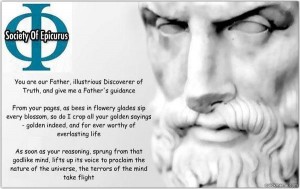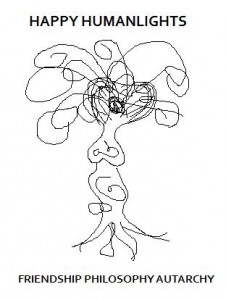For many years, we have had difficulty establishing with certainty the date of the birth of Epicurus. This is because the Attic calendar–whose months were mentioned in Epicurus’ Last Will and Testament–was not widely used. It was very much a local calendar, and was lunisolar, which adds great confusion for us who are used to our (solar) Gregorian calendar. The Birth of the Hegemon should naturally be our biggest holiday, our equivalent of Christmas, Mawlid, or Buddha Purnima, so at the SoFE we decided it was time to fix the date and to start developing traditions around the holiday of the Birth of the Hegemon.
The Lunisolar Calendar Discussion
We looked into various possible solutions. I considered adapting the Attic calendar into a simplified lunisolar calendar, abandoning the traditional and difficult-to-pronounce Greek month names and replacing them with the generic “First Moon”, “Second Moon”, etc. as names for our months. Some years would have twelve moons, and others would have thirteen. According to Wikipedia:
The year was meant to begin with the first sighting of the new moon after the summer solstice.
This would have been easy enough, as there are plenty of lunar calendars online we can consult. In his final will, Epicurus describes “the customary celebration of my birthday on the tenth day of Gamelion in each year“. Gamelion was the seventh month, which typically falls in January-February. But in 2020-2021, the summer solstice coincided with the new moon, and therefore the lunisolar months came very early. According to space.com, there was a new moon on June 21st of 2020, which is right at the solstice, so the solstice coincided with the New (Lunisolar) Year.
If we count seven new moons from there, we will see that space.com sets the seventh new moon of year 2,361 of the Age of Epicurus as December the 14th.
Therefore, the tenth day of the seventh moon in this simplified lunisolar calendar, counting from December 14th, would have been the 23rd day of December of 2020–which would have been the Birth of the Hegemon in our simplified lunisolar calendar. However, in the ancient Attic calendar, each month began with the “first sighting of the new moon”, which in this case was probably one or two nights after the New Moon of the 14th of December of 2020. We are beginning to see how difficult it is to plan ahead for this, which creates many disadvantages.
When we say that we are in the Year of Epicurus 2,361, we calculate that from 2020 (current year in the Gregorian calendar, which begins the lunisolar cycle of 2020-2021), plus 341 (Before Common Era, the year of his birth).
When I consulted with the other members of the SoFE concerning the problem of the date of this holiday, we considered the possibility of adopting a private lunisolar calendar merely with the intention of clearly calculating the Birth of the Hegemon every year, and we had to carry out hedonic calculus between this option and sticking to our familiar Gregorian calendar for the sake of simplicity, ease, and custom. The idea of fixing the Birth of the Hegemon to the Gregorian calendar prevailed. While I am not averse to the idea of a lunisolar calendar, the utility of this is limited, since the only major lunisolar holiday we celebrate is the Birth of the Hegemon.
Also, we customarily have zoom gatherings on the Twentieth of every month (or sometimes on the most convenient date close to the Twentieth), which makes it advantageous to merge the Birth of the Hegemon and the Twentieth on its given month, and also helps us to respect and to make the best use of each other’s time.
Therefore, the Society of Friends of Epicurus has officially set the holiday of the Birth of the Hegemon to be henceforward celebrated on the 20th of February every year.
Meaning of Hegemon
Epicurus was known as the Hegemon by his disciples. We pronounce this word according to the US conventional pronunciation found here. This word is related to “hegemony”, which translates as:
preponderant influence or authority over others. – Webster Dictionary
Other translations of the word are political, and do not apply to the ancient usage. This does not mean that he is infallible, or a prophet. He’s the founder of our School, our moral example due to his empirical thinking, clear and frank speech and clear thought, freedom from superstition and harmful beliefs, his pleasant disposition, his autarchy, his friendliness, and his kindness. He was the first Epicurean, the one whose name (and a portion of his identity) we make our own when we call ourselves Epicureans. The name Epicurus means “Friend” or “Ally”, and we know that friendship was holy to the first Epicureans, so in our Koinonia we strive to be true Friends and allies to each other.
We recognize only Epicurus of Samos as our Hegemon. His successors (diadochi) of direct lineage in the Garden of Athens were known as Scholarchs (Hermarchus, Polystratus, Zeno of Sidon, etc.) The Age of the Scholarchs lasted over five centuries. No one today can claim direct lineage, and so there are no Scholarchs today.
Under the Scholarchs, were the kath-hegetes (Guides)–people like Philodemus of Gadara, Philonides of Laodicea, Diogenes of Oenoanda, etc. In our SoFE lineage, this is the only office that we recognize as still potentially existing today.
In Celebration of the Birth of the Hegemon
Today is for remembering some of the key events in the biography and some of the key features of the character of Epicurus of Samos through poetry, declamation, and other art forms. We encourage all followers of Epicurus to write their own poems and statements in memory of the Hegemon for this day and to publish them on social media, or to share Lucretian and other relevant sources.
Today, we Hail the Hegemon and we invite all followers of Epicurean philosophy to learn about, toast, celebrate, and remember Epicurus in your own way. We wish you a pleasant Hegemon Day. Peace and Safety!
This is by Matt:
Hear these words O children of Nature’s swerve.
Let us rejoice in the freedom we desperately deserve.
Of prudent wisdom long obscured by shame.
Professed by Epicurus of noble fame.
Lucretius penned in days of old.
Across the gap of time, a truth so bold.
Arise the days of hedonic measure.
Restoring the truth of humankind’s pleasure.
Dispel the fears of death’s illusion.
Release humankind from all confusion.
Again I say, O children of Nature’s swerve.
Be frank in speech and keep your nerve.
Be ready now to strike your blow.
For Epicurus, his Garden and all who know.
The days shall come when the world will extol.
That pleasurable living was indeed the goal.



